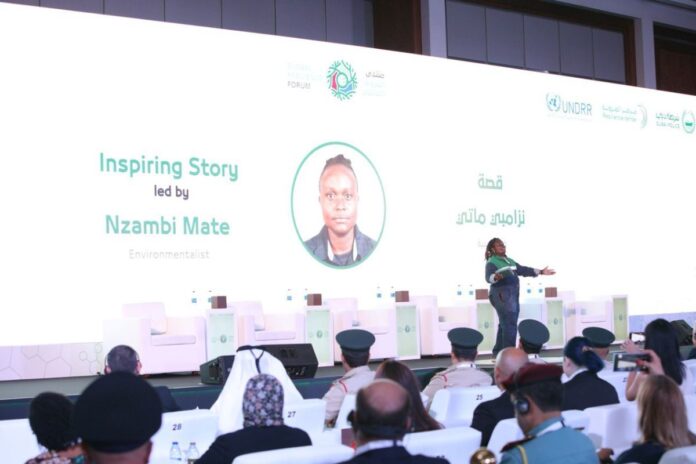The inaugural edition of the Global Resilience Forum took place today at Hilton Al Habtoor City in Dubai, with more than 150 VIP delegates, 500 attendees, and 35 speakers from around the world coming together to discuss the necessary requirements to bolster climate change resilience.
Jointly organised by Dubai Police, the United Nations Office for Disaster Risk Reduction (UNDRR), the Dubai Resilience Centre, and MCR2030, the opening ceremony was attended by His Excellency Abdulla Al Basti, Secretary General of The Executive Council of Dubai, His Excellency Lieutenant General Abdullah Khalifa Al Marri, Commander-in-Chief of Dubai Police, Her Excellency Razan Al Mubarak, UN Climate Change High-Level Champion for COP28 and IUCN President, His Excellency Ali Saeed Al Neyadi, Chairman of the National Crisis, Emergency and Disaster Management Authority, and Mami Mizutori, the Special Representative of the United Nations Secretary-General for Disaster Risk Reduction and head of UNDRR.
Speaking from the opening morning of the forum, His Excellency Lieutenant General Abdullah Khalifa Al Marri, Commander-in-Chief of Dubai Police, said;
“I would like to thank our partners, stakeholders and participants for their invaluable contributions in making the first edition of the Global Resilience Forum a monumental success. This event underscores the transformative power of collaboration in bolstering disaster resilience. I firmly believe the insights and dialogues from this forum will catalyse impactful actions as the United Arab Emirates proudly prepares to welcome the global community at COP28 in the coming month.”
Delivering the opening keynote speech, Her Excellency Razan Al Mubarak, UN Climate Change High-Level Champion, warned attendees that without proper governance, the global climate crisis will continue to spiral.
“A global understanding of what resilience means can never be truer, and more urgent than today as we face the risks of climate change,”
she said.
“We don’t exist in a vacuum; we have all been hearing and reading the news about the climate risks we face today. Risks are becoming more frequent and damaging, and from a regional perspective, our climate is heating twice as fast as the global average, and we expect demand for cooling to increase by 20 per cent by 2050, with the estimated increase of costs to reach US$800 million per year.
“We have also seen the awful droughts engulfing the regions of Iran and Iraq, recent floods in Somalia, Libya, Morocco… These are, unfortunately, just a few examples, so in this context resilience is not a nice thing to have, but rather a necessity. It does not only require us to build robust infrastructure, but also to build the social and governance systems to work together in the face of these challenges. Today’s gathering reflects the type of collaboration needed to ensure we’re prepared, respond in an efficient and coordinated matter during emergencies, and allow us to recover quickly and with the least damage possible.”
Also addressing the forum in the morning sessions was Mami Mizutori, the Special Representative of the United Nations Secretary-General for Disaster Risk Reduction and head of UNDRR, who spoke of a “shared commitment” to enhance resilience globally, regionally, and nationally.
“My heartfelt appreciation goes out to the United Arab Emirates for its dedication to tackling climate risk, which is such a beacon of hope at this moment when all countries and cities are attacked daily by climate-related emergencies,”
she said.
“But it is not enough for local and national governors and city mayors to come together. We need a more expanded partnership with the private sector, science, technology, and academia. This is why this conference is so important to bring together different stakeholders in the lead-up to COP28 with a call to action to scale up urban resilience for a changing climate.”
Rounding out the morning keynote sessions was a groundbreaking address from Kenyan engineer and environmentalist Nzambi Matee, who is also the founder of Gjenge Makers. Matee founded the company with a vision to help reduce Kenya’s plastic waste epidemic by converting plastic waste into a readily available source of attractive building materials used to enhance Nairobi’s pavement and road networks. So far, her company has recycled more than 150,000 tonnes of plastic garbage into building materials, in turn creating 112 jobs for women, youth organisations, and garbage collectors.
“When discussions happen around climate change, it is always doom and gloom, but positive changes are happening out there to help make a difference,”
she said.
“I am here to show you there is hope, and we need to be able to create the future we want. Plastic waste is not just a problem in Kenya, but across the world, impacting everyone in one way or another. If we are to build change, we need everyone to play their part, as we can’t do it alone. I want the people in this Forum to join me and let’s build a future, literally, brick-by-brick. We have the capability to create around 300,000 bricks at the moment using plastic waste and have, to date, made or upgraded 20 roads in Kenya. Imagine what we can achieve with the right support – that can start right here.”
Over the next two days, the forum is exploring key themes such as risk governance and a whole-of-society approach to reducing risk, as well as cooperation with the private sector, technology providers, and innovators to develop risk-reduction solutions.
Other confirmed speakers include His Excellency Major General Khaled Fouda, Governor of South Sinai; His Excellency Dr Mehmet Duman, Secretary General of the UCLG MEWA; Dr Patricia McCarney, President and CEO, the World Data City Council; Dr Nehal Hefny, Deputy Regional Director, IFRC MENA; and Mr Gino Van Begin, Secretary General, ICLE.
News Source: Dubai Media Office
